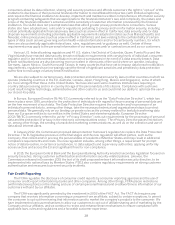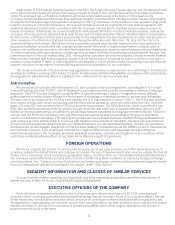American Express 2015 Annual Report Download - page 41
Download and view the complete annual report
Please find page 41 of the 2015 American Express annual report below. You can navigate through the pages in the report by either clicking on the pages listed below, or by using the keyword search tool below to find specific information within the annual report.
necessary, through the course of the customer relationship. The Global Anti-Money Laundering Policy is also designed
to ensure there are appropriate methods of monitoring transactions and account relationships to identify potentially
suspicious activity and reporting suspicious activity to governmental authorities in accordance with applicable laws,
rules and regulations. In addition, the American Express Global Anti-Money Laundering Policy requires the training of
appropriate personnel with regard to AML and anti-terrorist financing issues and provides for independent testing to
ensure that the Global Anti-Money Laundering Policy is in compliance with all applicable laws and regulations.
Office of Foreign Assets Control Regulation
The United States has imposed economic sanctions that affect transactions with designated foreign countries,
nationals and others. The United States prohibits U.S. persons from engaging with individuals and entities identified as
“Specially Designated Nationals,” such as terrorists and narcotics traffickers. These prohibitions are administered by
the U.S. Department of the Treasury’s Office of Foreign Assets Control (“OFAC”) and are typically known as the OFAC
rules. The OFAC rules prohibit U.S. persons from engaging in financial transactions with or relating to the prohibited
individual, entity or country, require the blocking of assets in which the individual, entity or country has an interest, and
prohibit transfers of property subject to U.S. jurisdiction (including property in the possession or control of U.S.
persons) to such individual, entity or country. Blocked assets (e.g., property or bank deposits) cannot be paid out,
withdrawn, set off or transferred in any manner without a license from OFAC. We maintain a global sanctions program
designed to ensure compliance with OFAC requirements. Failure to comply with such requirements could subject us to
serious legal and reputational consequences, including criminal penalties.
Pursuant to Section 219 of the Iran Threat Reduction and Syria Human Rights Act of 2012, which added
Section 13(r) to the Securities Exchange Act of 1934, as amended (the “Exchange Act”), an issuer is required to
disclose in its annual or quarterly reports, as applicable, whether it or any of its affiliates knowingly engaged in certain
activities, transactions or dealings relating to Iran or with individuals or entities designated pursuant to certain
Executive Orders. Disclosure is generally required even where the activities, transactions or dealings were conducted
outside the United States by non-U.S. affiliates in compliance with applicable law, and whether or not the activities are
sanctionable under U.S. law.
During the year ended December 31, 2015, American Express Global Business Travel booked three hotel
reservations at Homa Hotel Tehran, one hotel reservation at Esteghlal Grand Hotel and two hotel reservations at
Esteghlal East Wing Hotel. In addition, certain third-party service providers obtained approximately 40 visas from
Iranian embassies and consulates around the world during the year ended December 31, 2015 in connection with
certain travel arrangements on behalf of American Express Global Business Travel and TLS clients. We and American
Express Global Business Travel had negligible gross revenues and net profits attributable to these transactions.
American Express Global Business Travel believes these transactions were permissible pursuant to certain
exemptions from U.S. sanctions for travel-related transactions under the International Emergency Economic Powers
Act, as amended. American Express Global Business Travel has informed us that it intends to continue to engage in
these activities on a limited basis so long as such activities are permitted under U.S. law.
In addition, a travel company that may be considered an affiliate of ours, American Express Nippon Travel Agency,
Inc. (“Nippon Travel Agency”), has informed us that during the year ended December 31, 2015 it obtained 92 visas
from the Iranian embassy in Japan in connection with certain travel arrangements on behalf of its clients. Nippon
Travel Agency had negligible gross revenues and net profits attributable to these transactions. Nippon Travel Agency
has informed us that it intends to continue to engage in this activity so long as such activity is permitted under U.S.
law.
Compensation Practices
Our compensation practices are subject to oversight by the Federal Reserve. In June 2010, federal banking
regulators issued final guidance on sound incentive compensation practices that applies to all banking organizations
supervised by the Federal Reserve, including bank holding companies, such as the Company, as well as all insured
depository institutions, including Centurion Bank and American Express Bank. The final guidance sets forth three key
principles for incentive compensation arrangements that are designed to help ensure that incentive compensation
plans do not encourage imprudent risk-taking and are consistent with the safety and soundness of banking
organizations. The three principles provide that a banking organization’s incentive compensation arrangements
should (1) provide incentives that appropriately balance risk and financial results in a manner that does not encourage
employees to expose their organizations to imprudent risks, (2) be compatible with effective internal controls and risk
management, and (3) be supported by strong corporate governance, including active and effective oversight by the
organization’s board of directors. Any deficiencies in compensation practices of a banking institution that are
identified by the Federal Reserve or other banking regulators in connection with its review of such organization’s
compensation practices may be incorporated into the organization’s supervisory ratings, which can affect its ability to
make acquisitions or perform other actions. The final guidance provides that enforcement actions may be taken
against a banking organization if its incentive compensation arrangements or related risk-management control or
governance processes pose a risk to the organization’s safety and soundness and the organization is not taking
prompt and effective measures to correct the deficiencies.
30
























